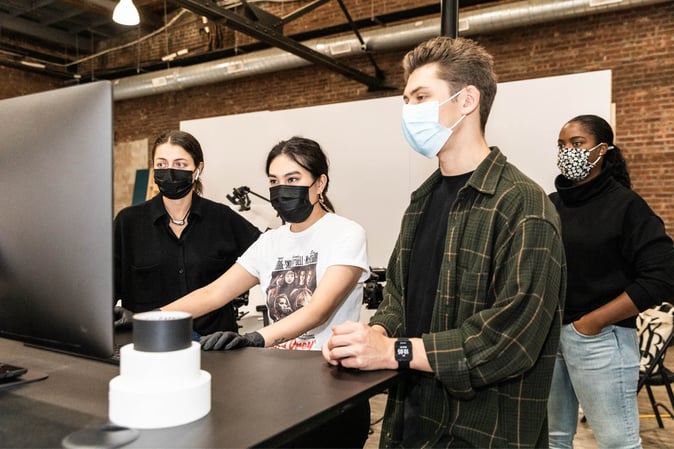Empower Your Team: The Case for Training Managers in eComm Studios
A stylist hired two months earlier struggles on set because he knows that, several weeks into his new gig, he's still not doing his best work. His workplace experience has quickly become synonymous with hesitancy and failure, not freedom and creativity.

In another studio, a frustrated photographer shakes her head because other staff photographers have been trained on the latest Capture One update, but she didn't receive the same primer. Sick of feeling behind, she updates her résumé and portfolio that evening and begins searching for new opportunities.
These vignettes, while imagined, aren't far off from the reality that some creative production professionals live every workday. The last few months of hosting The Creative Operations Podcast have given me an important perspective: We work in an adolescent industry. Closely related to the creative roles of days past, but never-the-less entirely new and young with the explosive growth of eCommerce, particularly since 2008. It's long past time we reassess the role that a dedicated training manager might play in an eCommerce content studio.
Adding a devoted training manager...is a step toward creating a workplace that's efficient and equal, the type of place where people want to work...and do their best work.
There's a Training Deficit in Many Industries-Studios are No Exception
Look, I'm not saying photo studios are the only workplaces suffering from a lack of structure in training. There's a common pattern seen across all industries: people feel under-informed and ill-equipped to start a new role, so insecurity leads to a diminished enthusiasm for their work, and then they feel more inclined to leave for another company.
According to a 2020 Gallup poll, a mere 31% of U.S. employees feel engaged at their workplace. While the Gallup results didn't specify a connection between engagement and training (both initial and ongoing), that tie aligns with my informal research and observations over the years.
In the e-commerce studio industry, I see the gap in training being especially pronounced. Because while most small business settings have 15 training staff members per 1,000 employees, according to Training Magazine's 2020 Training Industry Report, e-commerce studios are seemingly ahead of the industry if they have even one devoted training manager.
It's understandable why our industry arrived at this point. Content production for eCommerce is a relatively new industry, and many studios have the characteristics of startups-even within legacy companies, these studios tend to take a startup-within-the-business persona-so they don't have the highest corporate infrastructure that might emphasize and formalize training. And yet, as our industry matures, the need for that formalized training approach is becoming evident.
Making the Case for a Training Manager
If you'll allow me to persuade you, I'll make a (compelling!) case for you to add a devoted training manager to your studio.
With So Many Distinct Roles and Skill-sets, Your Team Requires More Training Than You Think They Do.
It's not like there's a general job description, "studio employee," and everyone in-house has a uniform set of tools and software to learn. You have photographers, stylists, producers, a samples team, prep teams, and so on. The person unpacking the product may not be the same one who preps it, and certainly not the same person who styles it. Roles are specialized. If you trust training to each employee's immediate supervisor, you have wildly disparate training experiences and incredibly burned-out supervisors.
Rely on Freelance Talent? Good Luck Making Sure They're Caught Up
A recurring thorn in my side when managing a studio team was keeping track of which freelance team members were caught up to the latest workflow, style guide, or software changes. Using freelance talent is great when it comes to drawing on their wealth of experience, but it also means that they may not work in your studio for weeks on end while on assignment elsewhere. The hottest new training effort two weeks ago is long since old news by the time they make it back to your studio. Imagine having a dedicated member of the team whose job was to ensure that your freelancers were up to date since the last time they came in.
A Studio's Heavy Use of Software Means That Training Is Never Complete.
It's not like training is only the initial onboarding process after a new hire. In the studio environment, where each role utilizes a different combo of software programs, and where those programs become borderline unrecognizable after yearly or bi-yearly updates, there's always someone in need of a catch-up on the latest update to Capture One or Lightroom or Bridge, or your DAM, PIM, or whichever other piece of software.
So even after you train a new hire, they're a year or two from new keyboard shortcuts, new functionality, new tech stack integrations-new questions. The endless evolution of these software programs can be wonderful, but it increases the need for eternal training.

Professional Development Requires Cross-Training.
I've talked in survivalist terms-helping people complete the tasks required in their day-to-day-but what about the cross-training that goes into helping your studio employees further their careers, giving you a culture where you can promote from within? It's more abstract than urgent, but there's a benefit to giving your team a baseline familiarity with the procedures and tools of several studio roles.

Training Makes Employee Experiences Equitable.
To me, the strongest reason to streamline the training process through a devoted manager is that you want every studio worker-regardless of age, race, gender, sex, and so on-to benefit from the same initial onboarding, continued education, and professional development.
In the fast-paced environment of an e-commerce studio, where output is a key metric in performance reviews and where promotions can be tied to what continued education and cross-training an employee has received, it's dangerous to leave training to a subjective, informal process.
A recent McKinsey report examining the experience of Black workers in the U.S. finds that Black employees, for so long overrepresented in frontline work and underrepresented in managerial roles, are 23% less likely to receive "a lot" or "quite a bit" of support to advance in their careers.
In the coldest, most pragmatic terms, we can acknowledge that a training manager could be cheaper than a lawsuit. Plus, workplaces with more diversity are more profitable. But dear reader, I know that you're not thinking in strictly pragmatic terms, that you want all employees to have the same positive experience because it's the right thing to do.
In an e-commerce studio, where output is a key metric in performance reviews and... promotions can be tied to what...training an employee has received, it's dangerous to leave training to a subjective, informal process.
Thoughts From the eCommerce Community
So if standardized training practices are so important, and the ramifications of lacking a uniform practice so severe, how has the e-commerce studio industry addressed the need so far? For this, I turned to our community of colleagues, asking what's been done in their companies.
Here are a handful of the responses:
Jennifer Bakija, now senior manager of visual rich content at Grainger, has seen firsthand how helpful a training manager can be-she was one. "Years ago, I had the role of training and technical manager for a team of 25-plus graphic designers," Bakija says. "I was tasked with all onboarding and also provided in-depth training on new versions of Photoshop, typography, naming practices, etc. I loved it." But Jennifer hasn't since seen this position in any organization she's worked with. "Currently our lead photographer takes this over in the studio, but in our broader visual organization, I see a huge benefit of this being someone responsible for all three visual teams." (Jen was a recent guest on our The Creative Operations Podcast, listen to her full episode to learn more about ways she supports her team).
Ali McLeod, associate vice president of photo studios at Saks Fifth Avenue brings a vantage point more common in the e-commerce studio industry. "Never have we leaned on HR or recruiting partners for help with this," McLeod says. "Too often our area of business is greatly misunderstood, and so taking control of it ourselves has provided better results."
Clair Carter-Ginn, a partner at Forecast, has incorporated HR somewhat into the training process but has most often seen training responsibilities fall on a creative operations leader. "I usually tried to partner with HR to find a happy medium in terms of onboarding responsibilities and then asked each individual team to appoint a representative to spend time with new hires," Carter-Ginn says. "Recently, I actually wrote this into the job description for a resource manager role, which I think could be a great solution, provided the timing and bandwidth works." (Clair was also on our podcast recently, listen to my conversation with her to learn more about talent and casting for creative production)
In all, our community returned to a familiar refrain, that it's difficult to add such a full-time training manager once a studio is well established-it's tough to persuade people to backtrack in a sense and add this foundational role. To those we surveyed, on average, it seemed more feasible to build this responsibility into an existing role.
But doesn't an especially proficient training manager have an education and training specific to that role?
The Cost and Value of a Training Manager
As we all know, if training managers worked pro bono, most every studio would add one. But unsurprisingly, these professionals are compensated for their efforts. A solo training manager-someone functioning as a one-person department-made between $65,000 and $84,000, depending on the region, in the U.S. last year, according to Training Magazine.
That salary level is a painless addition in some studios and a budget conundrum in others. Whatever your studio's situation, we'd advise setting clear KPIs you can associate with the role to demonstrate its worth. (Learn more about setting clear goals and KPIs for your studio in our free KPI Guide: https://www.creativeforce.io/kpi-guide/introduction-to-studio-reporting-and-kpis/)
First, how much voluntary turnover did your studio have before the training manager's hiring, and how much does it have after? Multiply these raw totals by $15,000, the number that the Work Institute sets as the cost of termination, recruitment, vacancy cost (like opportunity cost while the position sits open), and learning curve (productivity loss while the next person trains).
Then, look at increased throughput as an outcome of improved training, and find a monetary value you can pin to better productivity.
Also, any time you're able to promote someone from within because of cross-training and career development they received from a training manager, calculate the costs saved in recruitment.
The numbers keep piling up. What's the monetary value of your current team leaders' hours training employees? With a training manager in place, your creatives are free to focus on the work they know best.
There are more costs to consider, undoubtedly. For many studios, these calculations will prove that a training manager is not only stress-relieving but also lucrative.

Plan B: Hybrid Titles for Your Training Manager
But what do you do if, despite the numbers proving a training manager's worth, your studio still can't or won't add a dedicated role? Try creating a role that combines training with other tasks that require similar skills.
For instance, most studios have standard operating procedures (SOPs) that ought to be documented. These are living documents that, in part because of oft-updated software programs, need to be revised and maintained. If you're worried that your dedicated training manager won't be kept busy, make this person your keeper of the SOPs-it's sure to fill their time and save everyone else's. Or have your training manager work with HR on recruitment efforts. Someone so versed in the current industry standards for software and equipment can ask the right questions to determine what training a candidate will need and how qualified the candidate is for the role in question.
However you decide to divvy up a training manager's time, there are enough education-oriented tasks to keep your incoming education expert busy.
Efficiency and Equity
If I sound like I'm trying to persuade you, it's because I am. No, I don't have many training manager friends who put me up to the task. I'm just adamantly ideological about a few things:
- Everyone should have the same chance to learn, perform, and ascend in their careers.
- Creatives should be free to create.
- E-commerce photography and content is great work-the type that a lot of talented people will stick with when given the right environment to succeed.
Adding a devoted training manager in some capacity, at least to your studio team is a step toward creating a workplace that's efficient and equal, the type of place where people want to work and where they do their best work.


